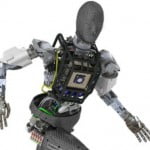

| Visitors Now: | |
| Total Visits: | |
| Total Stories: |

| Story Views | |
| Now: | |
| Last Hour: | |
| Last 24 Hours: | |
| Total: | |
Will Computers And Humans Make Decisions Together In The Future?
Will Computers And Humans Make Decisions Together In The Future? – NoCamels – Israeli Innovation News 
|
 |
Will Computers And Humans Make Decisions Together In The Future?
Posted: 23 Apr 2013 04:53 AM PDT
The era of robots learning and reacting the same way humans do may still be in the realm of science fiction, but a young Israeli researcher is making impressive advances in the way computers understand and interact with humans.
Dr. Ya’akov (Kobi) Gal from Ben-Gurion University of the Negev‘s research focuses on designing “intelligent agents” – algorithms that run on computers, robots and smart phones – and interact with other people as well as computers. The goal of his research is to enable computers to understand how humans make decisions and to use this information to foster cooperation between robots and humans in domains such as strategic negotiation and education.
Basically, Gal is not trying to teach computers to think for humans, but rather, to think with them.
Related articles
- Science, Not Fiction: Technion And Microsoft Develop Program To Predict Future
- Racism And Lack Of Creativity Are Closely Linked, Study Shows
Gal’s thesis is that the future role for intelligent agents is not to replace human professionals, a fear that is often expressed, but rather “share the problem solving” with humans in a way that best utilizes people’s abilities. To this end, Gal synthesizes techniques and approaches from computer science, economics and psychology in novel ways.
Bridging the cultural gap
In one study, Gal designed an intelligent agent for learning to negotiate with people from different cultures. The agent, designed in collaboration with Bar-Ilan University and the University of Maryland, is based on a mathematical model about people’s reliability and fairness during the negotiation process. For example, the agent learned that in some Arab countries, reaching agreements can take significantly longer than in Israel and the US, but once an agreement is reached, people are more likely to stick to it.
Do not disturb
Another project, in collaboration with Harvard University and Microsoft Research, includes the design of intelligent agents that learn to manage interruptions when interacting with human users. Interruptions are an endemic aspect of human communications (especially in Israel) in order to provide or request useful information. However, there is much research demonstrating that such interruptions are costly – they decrease our efficiency, irritate and carry a cognitive load.
An example is the dreaded “Clippy” application that some of us may remember from earlier Windows versions (“Are you trying to write a letter?”). In contrast to Clippy, Dr. Gal’s agent predicts people’s responses to machine-generated interruptions in different types of settings, and the computer agent uses this information to determine how to interrupt the user in a way that minimizes intrusion while providing necessary information.
A third project concerns the intelligent analysis of students’ use of “virtual laboratories” – open-ended and flexible software for science education, supporting students’ use of exploratory activities and trial-and-error which characterize scientists’ work in real laboratories. Such software programs are becoming prevalent, especially in developing countries where access to teachers is limited. Although they provide a rich educational environment for students, they are notoriously difficult to analyze for teachers and educational researchers.
Gal’s algorithms infer students’ activities from their traces with the software using artificial intelligence techniques, and visualize these activities in a way that supports their understanding of the individual strengths and weaknesses of the students.
For his innovative research, Gal is about to receive the 2014 Krill Prize for academic excellence among young Israeli scientists, which is granted annually by the Wolf foundation.
Filed under: Uncategorized
![]()
2013-04-23 15:00:37
Source:







